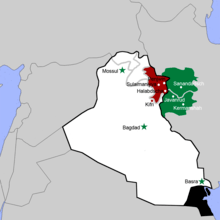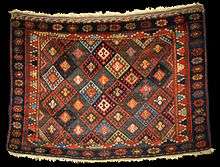Jaff
The Jaff tribe people (also Jahf, Jaaf, Jaf, Caf or جاف) are divided between Iran and Iraq. It originated in the year 1114 by Kurdish King Zaher Beg Jaff, other important leaders were Mohamed Pasha Jaff, Lady Adela, Osman Pasha Jaff and Mahmud Pasha Jaff, their ancestral home is Sherwana Castle. The Ottoman Empire bestowed on them the name Pasha, a noble title, in the 1700s. They are one of the biggest Kurdish tribe in the Middle East with approximately 4 million people. But the biggest kurdish tribe is Milan tribe with over 5 million members.
Geographic distribution and clans

Total population of the tribe is estimated at 3 to 5 million people in both Iraq and Iran. At present, they are settled mainly in Sulaimaniya Governorate of Iraq, especially Halabja and Kalar as well as in the Kermanshah region of Iranian Kurdistan.
History
The Jaff dialect (called Jaffi) is part of Sorani, a south-southeastern branch of Kurdish language family. The region inhabited by this tribe is southwest of Sanandaj all the way to Javanroud, and also areas around the city of Sulaimaniyah in Southern Kurdistan. Once nomadic, the Jaffs have more recently settled into a predominantly agricultural way of life and are often known as the most educated and intellectual tribe of the Kurds.
The tribe is believed to have its origins in the early seventeenth century. In spite of the signing of the Treaty of Zuhab of 1639 between the Ottoman Empire and the Safavid , which defined the frontiers between the two powers, the members of the Jaff tribe continued to cross the border from side to side in search of pastures. These displacements were "a constant focus of tension" in the area. With an important nucleus in Halabja -the Jaff would have repopulated this city in the eighteenth century, the 9th century during which much of them left their settlements in Iran, Settled in Ottoman lands dominated by the Baban has been cited as one of the main tribal groups in this border territory.
The West began ties with the Jaff tribe during World War I, when Ely Bannister Soane established contact. After the war, the tribe opposed Sheikh Mahmud Barzanji, as well as Great Britain’s failure to grant Kurdish autonomy in Iraq. [1]
Saddam Hussein's chemical attack on Halabje on March 16, 1988 killed at least 5,000 people and injured or sickened 7,000 more. The majority of these victims were Jaff tribe members.
Notable members

.jpg)
- Leaders and politicians
- Mohamed Pasha Jaff, a Kurdish King and supreme chief of the Jaff tribe, he built Sherwana Castle in 1734.
- Mahmud Pasha Jaff, was born in 1845. Kurdish King and supreme chief of the Jaff tribe. He had been the vessel in which his grandfather Mohamed Pasha Jaff had fulfilled his lifetime quest, which was the destruction of the Baban clan and archrival to the throne of the Jaff tribe.
- Osman Pasha Jaff, (born 1846) a Kurdish King, leader of the Jaff tribe, and married to Adela Khanum of the old Ardalan tribe.[2]
- Adela Jaff (1847–1924), called Princess of the Brave by the British; married Kurdish King Osman Pasha Jaff, was famous for her role in the region, namely in the era of Shiekh Mahmood Al-Jaff Hafeed.
- Ahmed_Mukhtar_Jaff (1898–1934), was a member of Iraqi parliament and mayor of Halabja. He had two sons, Afrasiab Jaff and Ghandi Jaff, as well as three daughters, Shamsa Jaff, Roonak Jaff and Hameeda Jaff.
- Akram Hamid Al-Jaff (1929-2010), Minister of Agriculture in Iraq in 1965-1967. Ambassador of Iraq in Italy in 2004-2008.
- Sirwan Abdullah Jaff (born 1938 or 1940), Chairman of the Head of Government for the autonomous region in Northern Iraq 1986-1989.
- Burhan Namiq Salm Jaff (born 1955), Ambassador of Iraq in Greece.
- Sami Said Qadir Muhammad Al-Jaff (born 1957), member of Iraqi National Assembly until 2003.
- Dawood Beg Jaff- Minister of Iran and leader of the Jaff tribe in the 1960s. [3]
- Shawkat Ali Muhammad Rasheed Al-Jaff (born 1964), member of Iraqi National Assembly until 2003.
- Jabir Al-Jaff, Federal Judge in Kirkuk High Court.
- Jalal Jaff, First Secretary of Iraq in China in 1960.
- Sardar Dawood Beg Jaff- Member of Parliament of Iran in 1970s, and leader of the Jaff tribe in 1980s-1990s.
- Salar Al-Jaff, Member of Parliament of Iran in 1970s.
- Mohammed Amin Al-Jaff, Ambassador of Iraq in Japan 1986, and Ambassador to Iraq in China 1991.
- Abdel-Qader Al-Jaff, City mayor of Arbil, Iraq in 1989.
- Jawhar Namiq Salm Jaff (also known as Salim Sorani), First President of the Kurdistan National Assembly in 1992, Military Head General of the Kurdish Revolution.
- Nawzad Dawood Beg Jaff (also known as Nozad Dawood Fattah Al Jaff), Chairman of North Bank Iraq and leader of the Jaff tribe.[4][5][6]
- Hanna Jaff (born 1986), American born Mexican-Kurd Deputy Secretary of Immigrants in the Institutional Revolutionary Party in Mexico, and Honorary Representative of Garmiyan in Latin America. [7]
- Artists, poets, singers
- El-Begi Jaff (1493–1554), poet born in Sharazor, who wrote in the Gorani dialect.
- Khanai Qobadi Jaff (ca.1700-1759), an 18th-century Jaff poet.[8]
- Nali Jaff (1797 or 1800-1855 or 1856), poet who contributed to making Sorani literary language of southern Kurdistan. [9]
- Abdulla Goran Jaff (1904-1962), the father of modern Kurdish literature.
- Tara Jaff (born 1958), singer and musician specializing in harp. [10]
- Scholars and academics
Jaff rugs
The Jaff tribe is known for their rugs, woven on 3 to 4 feet (0.91 to 1.22 m)-wide looms and usually twice as long as they are wide. The colors and patterns of old rugs and bag faces are highly prized, as the quality of Jaff weaving has declined in recent decades. The photo shows the distinctive diamond lattice pattern common on Jaff rugs and bags.

Notes
- ↑ Tripp, Charles. A History of Iraq. Cambridge Press, 2007. Page 33-34
- ↑ Tarih :17/N /1312 (Hicrî) Dosya No :35 Gömlek No :1312 Fon Kodu :İ..HUS.mm
- ↑ "DIPLOMATIC HISTORY: Shah of Iran Grants Assylum to Kurdish Prince Dawood Beg Jaff (1958)". Iranian. 18 November 2009. Retrieved May 22, 2018.
- ↑ "North Bank "in Good Position for Growth"". Iraq Business News. 31 May 2014. Retrieved May 28, 2018.
- ↑ ""Don't miss out, be a pioneer"". The Worldfolio. 2012. Retrieved May 28, 2018.
- ↑ "La tribu Jaff en la actualidad" (in Spanish). The Worldfolio. October 10, 2016. Retrieved May 28, 2018.
- ↑ "Hanna Jaff Bosdet" (in Spanish). Lideres. 13 October 2016. Retrieved 23 January 2018.
- ↑ ḴĀNĀ QOBĀDI, Encyclopedia Iranica, accessed December 1, 2012
- ↑ Keith Hitchins, "NALÎ" in Encyclaopedia Iranica
- ↑ World on Your Street, BBC Radio 3.
- ↑ "Dr Jaff - Durham University". www.dur.ac.uk.
- ↑ "Bahrouz M. A. Al- Jaff - Google Scholar Citations". scholar.google.com.
References
- Ateş, Sabri (2013). Ottoman-Iranian Borderlands: Making a Boundary, 1843-1914. Cambridge University Press. ISBN 9781107033658.
- Bruinessen, Martin van (2001). «From Adela Khanum to Leyla Zana. Women as political leaders in Kurdish history». En Shahrzad Mojab. Women of a non-state nation. The Kurds. Mazda Publishers. pp. 95–122. ISBN 9781568590936.
- Cecil J. Edmonds, Kurds, Turks and Arabs: Politics, Travel and Research in North-Eastern Iraq, 1919-1925, London, 1957. ISBN 0-404-18960-1
- Ely Banister Soane, Report on the Sulaimania district of Kurdistan. 1910
- Ely Banister Soane, Notes on the Southern Tribes of Kurdistan, Civil commissioner, Baghdad. 1918
- Entessar, Nader (2010). Kurdish Politics in the Middle East. Rowman & Littlefield. ISBN 9780739140390.
- Gunter, Michael M. (2010). Historical Dictionary of the Kurds (2nd edition). Scarecrow Press. ISBN 9780810875074.
- Hamzeh’ee, M. Reza Fariborz (2008). «JAF». Encyclopædia Iranica XIV (4). pp. 346–347.
- Hitchens, Keith. "Goran, Abdulla", In Encyclopedia of World Literature in the 20th Century. Vol. 2. 3rd ed., completely rev. and enl. Edited by Steven R. Serafin and others, pp. 276–277. Farmington Hills, MI: St. James Press, 1999.
- McDowall, David (2004). A Modern History of the Kurds: Third Edition. I.B.Tauris. ISBN 9781850434160.
- Minorsky, The Tribes of Western Iran, The Journal of the Royal Anthropological Institute of Great Britain and Ireland, pp. 73–80, 1945. (p. 78)
- Naval Intelligence Division (2014). Iraq & The Persian Gulf. Routledge. ISBN 9781136892660.
- Personalities in Kurdistan, Civil Commissioner, Baghdad. 1918
- Rich, Claudius James (1836). Narrative of a residence in Koordistan, and on the site of ancient Nineveh 1. Londres: James Duncan.
- Soane, Ely Banister (1914). To Mesopotamia and Kurdistan in disguise. Boston: Small, Maynard and Company.
- The Jaff family holds a Qajar firman of appointment of Mahmud Pasha Jaff as Khan in their possession
- Varios autores (1836). «Mr. Rich's Residence in Koordistan». The Asiatic Journal and Monthly Register for British and Foreign India, China, and Australia. Parbury, Allen, and Company. pp. 31–42.
- Varios autores (2005). R. Khanam, ed. Encyclopaedic Ethnography of Middle-East and Central Asia 2. Global Vision Publishing House. ISBN 9788182200647.
| Wikimedia Commons has media related to Jaf. |